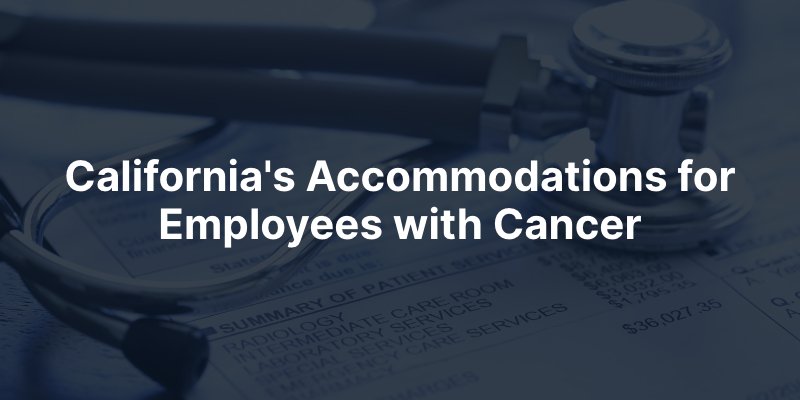A cancer diagnosis can significantly impact various aspects of life, including one’s ability to work. In California, employees facing cancer have legal rights and protections under state and federal laws. These laws require employers to provide reasonable accommodations to employees with cancer to ensure equal opportunities in the workplace.

Reasonable accommodations are modifications or adjustments made in the workplace that enable employees with disabilities, including cancer, to perform essential job functions effectively. These accommodations vary depending on the individual’s needs and the nature of their job but can include:
Employees with cancer who require accommodations should communicate with their employer or human resources department about their needs. It is essential to provide medical documentation from a healthcare provider outlining the diagnosis, treatment plan, and specific accommodations recommended. This documentation helps employers understand the employee’s limitations and identify appropriate accommodations.
Under the Americans with Disabilities Act (ADA) and the California Fair Employment and Housing Act (FEHA), employers are required to engage in an interactive process with employees to discuss potential accommodations and determine the most suitable solution. This process involves open communication, collaboration, and flexibility from both parties to find reasonable accommodations that meet the employee’s needs without causing undue hardship to the employer.
Individuals with cancer may require various accommodations in the workplace to address their specific needs and ensure they can perform their job duties effectively while managing their health. For example:
Flexible Work Schedule
Allowing the employee to adjust their work hours or work remotely to accommodate medical appointments, treatment schedules, or periods of fatigue.
Modified Workstations or Equipment
Providing ergonomic furniture, adjustable desks, or assistive devices to accommodate physical limitations resulting from cancer treatment or side effects.
Job Restructuring
Modifying job duties or responsibilities to accommodate changes in the employee’s physical or cognitive abilities, such as reallocating tasks that require heavy lifting or prolonged standing.
Temporary or Permanent Reassignment
Offering alternative assignments or positions within the company that better align with the employee’s abilities and limitations, either temporarily or permanently.
Accommodations for Fatigue Management
Allowing additional rest breaks, adjusting work hours, or providing a quiet space for relaxation to help manage fatigue related to cancer treatment or medication.
Accessible Facilities
Ensuring that workplace facilities, such as restrooms and break areas, are accessible and accommodating for individuals with mobility challenges or other disabilities.
Emotional Support and Counseling:
Offering access to employee assistance programs (EAPs), counseling services, or support groups to help employees cope with the emotional and psychological impact.
Leave of Absence
Providing unpaid leave or accommodating intermittent absences for medical treatment, recovery, or periods of illness.
Assistive Technology
Providing specialized software, devices, or tools to assist employees with communication, vision, or hearing impairments resulting from cancer or its treatment.
Training and Education
Offering training sessions or informational resources to educate coworkers and supervisors about cancer-related disabilities and how to support affected employees in the workplace.
Undue hardship refers to significant difficulty or expense imposed on an employer in providing accommodations to an employee with a disability, including those with cancer. Determining whether an accommodation poses an undue hardship involves a case-by-case analysis considering various factors, such as:
Cost
The financial resources of the employer, including the size and operating budget of the company, are assessed. Accommodations that require substantial financial investment may constitute undue hardship, especially for small businesses with limited resources.
Nature of the Accommodation
Accommodations that fundamentally alter the nature of the job or impose significant operational disruptions may be considered undue hardship.
Overall Resources
The overall resources available to the employer, including funding, personnel, and infrastructure, are taken into account. An accommodation that places an excessive burden on existing resources may be deemed unreasonable.
Effect on Business Operations
The potential impact of the accommodation on the employer’s business operations, productivity, and efficiency is considered. Accommodations that result in significant disruptions, decreased productivity, or safety concerns may be deemed undue hardship.
Health and Safety
The health and safety risks associated with the accommodation for other employees, customers, or the public are evaluated. Accommodations that pose substantial safety risks or compromise workplace health and safety standards may be considered unreasonable.
Precedent and Industry Standards
The employer’s past practices and industry standards regarding accommodations are examined. Accommodations that deviate significantly from established practices or industry norms may be viewed as undue hardship.
Available Alternatives
The availability of alternative accommodations that would effectively address the employee’s needs without imposing undue hardship is considered. Employers are encouraged to explore alternative solutions that balance the employee’s needs with the company’s operational constraints.
Employees with cancer are protected from discrimination and retaliation under state and federal laws. Employers are prohibited from discriminating against employees based on their disability status or perceived disability, including cancer. This protection extends to all aspects of employment, including hiring, promotion, compensation, and termination.
If an employer fails to provide reasonable accommodations or engages in retaliation or discriminatory practices, employees have the right to file a complaint with the Equal Employment Opportunity Commission (EEOC) or the California Department of Fair Employment and Housing (DFEH). These agencies investigate complaints of discrimination or retaliation and may pursue legal action against employers found in violation of anti-discrimination laws.
A trusted Orange County Employment Attorney can play a crucial role in advocating for the rights of employees with cancer when their employers fail to provide necessary accommodations. With extensive knowledge of complex employment laws and regulations, they can assess the situation, advise you on your rights, and assist you in negotiating with your employer to secure appropriate accommodations.
If negotiations fail, your Orange County medical leave retaliation lawyer can file a complaint with the EEOC or the DFEH and, if necessary, pursue legal action through litigation to ensure that your rights are upheld and that you receive the accommodations you need to continue working effectively while managing your health.